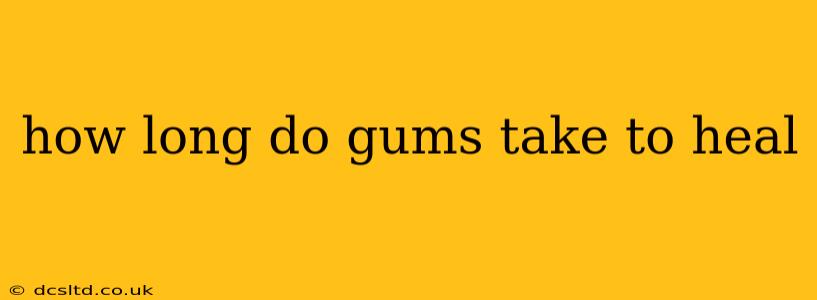How Long Do Gums Take to Heal? A Comprehensive Guide
Healing time for gums varies significantly depending on the cause of the injury or infection and the individual's overall health. There's no one-size-fits-all answer, but understanding the factors involved can provide a better estimate and help you manage expectations. This guide will explore the healing process and answer common questions about gum healing.
What Causes Gum Injury and Inflammation?
Before discussing healing times, it's crucial to understand what might have damaged your gums in the first place. Common culprits include:
- Gum disease (gingivitis and periodontitis): These infections cause inflammation, bleeding, and potential gum recession. Severe cases can lead to tooth loss.
- Dental procedures: Procedures like extractions, scaling and root planing, or even routine cleanings can cause temporary gum irritation and bleeding.
- Trauma: Accidental injuries from biting your cheek, a sports injury, or other trauma can damage gum tissue.
- Poor oral hygiene: Neglecting proper brushing and flossing allows plaque to build up, leading to inflammation and infection.
- Certain medications: Some medications can have side effects that affect gum health.
- Underlying medical conditions: Conditions like diabetes can impair healing and increase susceptibility to gum problems.
How Long Does it Take for Minor Gum Injuries to Heal?
Minor gum injuries, such as small cuts or abrasions from brushing too hard or accidental biting, typically heal within a few days to a week. Maintaining good oral hygiene is critical during this time. Gently rinsing with saltwater can help keep the area clean and promote healing. If bleeding persists or the area shows signs of infection (increased pain, swelling, pus), consult a dentist.
How Long Does it Take for Gums to Heal After a Dental Procedure?
Recovery time after dental procedures varies:
- Routine cleaning: Mild soreness and slight bleeding might last a day or two.
- Scaling and root planing: More extensive procedures can cause some discomfort and swelling for several days, sometimes up to a week. The gums may feel sensitive to hot and cold for longer.
- Tooth extraction: Healing time after an extraction depends on the complexity of the procedure and the individual's healing capacity. It can take anywhere from a few weeks to several months for the extraction site to completely heal. A blood clot forms initially, followed by gradual tissue regeneration.
How Long Does it Take for Gums to Heal from Gum Disease?
Healing from gum disease depends on the severity:
- Gingivitis (early gum disease): With proper treatment (improved oral hygiene and professional cleaning), gingivitis often resolves within a few weeks.
- Periodontitis (advanced gum disease): Periodontitis requires more extensive treatment, possibly including scaling and root planing, antibiotics, or surgery. Complete healing can take months or even longer, depending on the extent of bone and tissue damage.
What Factors Affect Gum Healing Time?
Several factors influence how quickly your gums heal:
- Overall health: Individuals with underlying health conditions, such as diabetes, may experience slower healing times.
- Age: Older individuals may heal more slowly than younger ones.
- Smoking: Smoking significantly impairs healing and increases the risk of complications.
- Medication: Certain medications can interfere with the healing process.
- Hygiene: Maintaining excellent oral hygiene is crucial for promoting healing and preventing infection.
What Should I Do if My Gums Aren't Healing?
If your gums aren't healing as expected or you experience persistent pain, swelling, or signs of infection, consult your dentist immediately. They can assess the situation, determine the underlying cause, and recommend appropriate treatment.
Can I speed up the healing process?
While you can't drastically speed up the natural healing process, maintaining excellent oral hygiene, avoiding irritants (like smoking and certain foods), and following your dentist's instructions are crucial. A healthy diet also supports overall healing.
This information is for general knowledge and does not substitute professional medical advice. Always consult your dentist for diagnosis and treatment of any gum problems.
